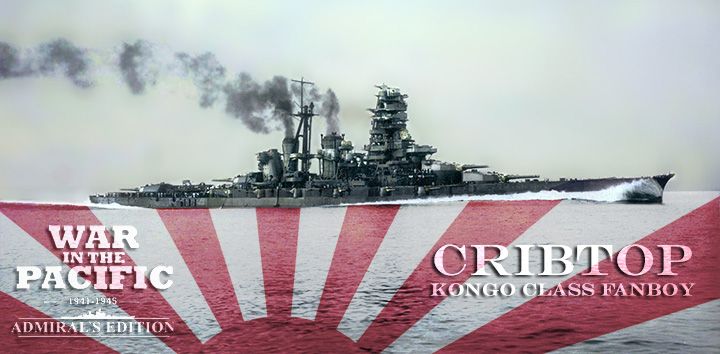Nemo121
Posts: 5821
Joined: 2/6/2004
Status: offline

|
Obvert:
I think the wikipaedia definition of culmination point really isn't one I'd agree with. I think it captures a large amount of the essence of the culmination point but I think it misses out on the importance of focus and orientation. I'll explain....
Defining the culmination point purely in terms of logistics, exhaustion and enemy opposition leaves one of the most important factors in failed offensives unconsidered; namely the opposing commander's loss of orientation and persistence in ordering operationally and strategically irrelevant attacks. I define anything which fails to further a cohesive strategic agenda as being pretty much irrelevant.
At this point in time the attacker maintains the ability to continue attacking and may even be doing so effectively but all attacks do NOT serve to further the greater strategic goals. E.g. In this game Japan could still continue attacking. Chez could launch a major offensive against some of the small islands in between Fiji and Hawaii. He could commit KB and he could utterly destroy the defenders of these islands, capturing them and adding them to the Japanese hegemony.
By the wikipaedia definition he won't have reached his culmination point because he is still capable of offensive action. I, however, would argue that in such a situation Chez has culminated because he is NOT capable of further offensive action in the theatre of strategic decision ( the DEI ) given the misallocation of resources to subsidiary theatres.
Another way to look at this is to look at games I've played - I list this only because I'm quite familiar with these games and thus can speak of the force correlations with some authority. I have, on several occasions, forced my opponent onto the defensive in early to mid-42 while they possessed more and better quality aerial units, ships, CVs and land forces. By the wikipaedia definition my opponent's hadn't reached their culmination point since they were still capable of offensive action. On the other hand through some OODA loop games and misdirection I transitioned onto the offensive long before the enemy had actually reached what, conventionally, would be considered their culmination point.
This leads to my next critique of the Wikipaedia definition. It is passive. I think that the defender can do a huge amount to culminate the enemy:
a) long before the enemy's military might has been eroded even to a position of equality with the defender and
b) long before the enemy realises they have culminated.
Obviously different people see this different ways. I think you are defining the culmination point as that time at which CR will attack ( Sept/Oct ). I would argue that the culmination point is actually that time at which CR could have attacked with a good chance of success of rolling one offensive into another a la Bagration ( which, IMO, was May 42 ). IF he had attacked at that time Chez would have been forced into a reactive posture and culminated.
My assessment is coloured by my philosophical approach to the situation ( discombobulate the opponent, rattle them, misdirect them and be prepared to attack when hugely outnumbered relying on psychological dysequilibrium and tempo to make up for the lack of numbers and/or quality ). Others opinions may well vary, of course.
Bottom line though I think that the different way of viewing the field of battle and the game ( I take an avowedly psychological approach and believe that the actual in-game results are just the working out the almost inevitable sequelae of the combination of logistics and OODA/tempo superiority ) yields slightly ( but significantly ) different ways of viewing culmination points and who controls the onset of such a point.
As to correct: Well, we type quickly. Let's assume I would, now, substitute optimal for correct such that the alternatives would, IMO, be sub-optimal rather than incorrect. On the plus side, the binary language drew you out from your hide and that's a good thing. Interesting discussion is always good.
As to being a fair way behind.... I wouldn't be so sure. Being open to these concepts and discussing them ( whatever your own interpretation of them is ) is a pretty good sign. In the end what matters is that you fit all of these concepts together in a framework which is consistent AND not cognitively dissonant with your normal way of viewing the world.
I think psychologically a lot so I tend to view a lot of these things with that psychological prism. Someone who is an engineer might view these things much more concretely and functionally. Is either "better" than the other? Not necessarily so long as both interpretations are cohesive, coherent and not cognitively dissonant with the overall way of viewing issues.
As to being pushed away. Never by anyone willing to engage in a proper discussion in which adults can agree to disagree and still respect eachother. People concerned with being right rather than correct and people who disrespect others make me realise there are places I can spend my time which are less frustrating --- and so I go, for weeks or months, when those people begin to intrude and remain unchallenged.
Desicat,
Given Chez's current play do you really think he will combine KB and LBA and naval power backed by sufficient land power to achieve an outcome which has anything more than strictly local significance?
Physically he can combine them but, as with Hannibal Barca, the question is NOT whether he could win a victory but whether he'd know what to do with it in order to turn that victorious operation into a strategically decisive operation. I don't think that, right now, he can do that. That's one of the reasons I say he has culminated. Yes he can attack but, as you say, to what end?
I think though that there's more to culminating than being unable to mount offensives. I think a culmination point can also be reached when the commander is unable or unwilling to mount further DECISIVE offensive action. Yes they can attack but, in effect, those attacks are little better than fritterings away of power in subsidiary theatres.
Overall though, from a concretist point of view I can't see a flaw in your assessment. I just amn't coming from a concretist point of view  . Not better or worse, just different. . Not better or worse, just different.
Greyjoy,
I read but I think if I commented it would be counterproductive. Right now your issue is not a lack commentary but rather an issue of quality and cohesiveness. Assuming everyone gives brilliant advice you could still be faced with a situation where Desicat and Obvert might advocate one line of approach and I another because our approaches are rather different. Both might be quite valid. They might also be mutually exclusive. I think your AAR is suffering from a little of that. But, that's all part of the learning experience.
< Message edited by Nemo121 -- 9/20/2011 10:58:36 PM >
_____________________________
John Dillworth: "I had GreyJoy check my spelling and he said it was fine."
Well, that's that settled then.
|
 Printable Version
Printable Version









 )? or would this be taboo?
)? or would this be taboo? 










 New Messages
New Messages No New Messages
No New Messages Hot Topic w/ New Messages
Hot Topic w/ New Messages Hot Topic w/o New Messages
Hot Topic w/o New Messages Locked w/ New Messages
Locked w/ New Messages Locked w/o New Messages
Locked w/o New Messages Post New Thread
Post New Thread